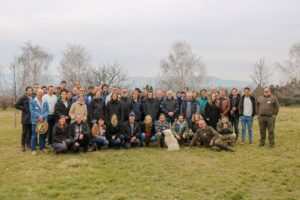
The network aims to re-connect farmers, millers, bakers and researchers in Hungary to re-establish historically broken local supply chains. They focus on artisanal bakery products made with stone-milled flour from landrace and heritage cereals. The network prioritises the exchange of knowledge and experience among supply chain actors to enable collaboration and increase the quality, quantity and predictability of local raw materials.
Name of organisation | Farmer-Miller-Baker Network |
|---|---|
Year established | 2018 |
Website | N/A |
Location | Hungary |
Type of organisation | An informal network of farmers, millers, bakers, and research organizations |
Key words | Collaborative short food supply chain; alternative grain economies; ‘heritage’ cereals; artisanal products; knowledge exchange |
Thematic focus | Education and Information |
What is the Farmer-Miller-Baker Network?
The network aims to re-connect farmers, millers, bakers and researchers in Hungary to re-establish historically broken local supply chains. They focus on artisanal bakery products made with stone-milled flour from landrace and heritage cereals, an approach which is unique in the Hungarian context.
Specifically, the network prioritises the exchange of knowledge and experience among supply chain actors to enable collaboration and increase the quality, quantity and predictability of local raw materials for artisanal baked goods in Hungary.
Values
Since its inception in 2018, the Network has been driven by providing healthy food to consumers. However, as the group has evolved, another important shared value has emerged: care for the health of the entire value chain. This means great care for, and transparency about, the origins of the raw materials used, an aspect which is explicitly communicated to consumers. In addition, while organic and sustainable production is essential to some network members, others place less emphasis on this aspect.
Governance
The network is a loose, informal grouping of supply chain actors without a formal governance structure and well-established decision-making procedures. Trust and personal connections play a key role in the collaboration.
Who does the Farmer-Miller-Baker network work with and how do they do it?
The main initiators of the Network were artisanal bakers with support from a research institute. Its core members include 10 farmers, 7 millers and close to 25 bakers.
Network members are scattered across Hungary. Therefore, cooperation at the local, territorial level has been a challenge, particularly given the low number of producers engaged in the supply chain. Nevertheless, bringing new producers and other supply chain actors into the network has enabled more players to enter the market. As demand outweighs the supply, farmers have been exceptionally well-positioned to set fair prices for their produce.
Besides the economic benefits generated, another key driver of cooperation is exchanging knowledge and experience among different supply chain actors in the network. Such a collaboration enabled members to understand mutually the needs, dilemmas and perspectives of each type of actor in the supply chain and associated work phases. For example, such exchanges have enabled farmers to understand better what makes a flour good from an artisanal baker’s perspective and why. And vice versa, bakers have gained insights into why farmers may choose to grow specific cereal varieties.
The network has also benefited from collaboration with research institutes – some specialised in agronomy, others in social sciences – through the provision of financial support and assistance in co-organising network meetings and events.
What are the Farmer-Miller-Baker Network’s main challenges?
A key challenge is to increase the number of farmers willing to engage in the supply chain on the production side. Currently, only a few organic farmers are eager to take the risk of experimenting with ancient and landrace wheat varieties or financing milling equipment on their farm. The high level of financial investment required to enter the market constitutes a significant barrier to millers and bakers. In order to address this barrier, the network has been considering jointly financing a mill and a storage facility.
From a consumer perspective, the higher prices of artisanal bakeries mean that higher-quality baked goods are inaccessible to lower-income consumers. In some cases, artisanal bakeries in the network offer loyalty cards to customers, providing 10-15% discounts on goods purchased.
Internally, the pandemic halted knowledge-sharing activities between members, and it has negatively affected the network’s capacity to bring in new members. Externally, there is an increased demand by different groups (e.g. schools) for learning opportunities on sourdough breadmaking, and network members are yet to develop educational packages and their capacity to deliver such services and apprenticeships.
What are the priorities for the Farmer-Baker-Miller Network?
Given the scarcity of high quality, locally produced cereals and flour, the network’s priority is to enhance cooperation with local farmers.
The network also wants to continue organising hands-on, practical exchanges between farmers, millers, and bakers, so they can experience directly how their collaborators work in action.